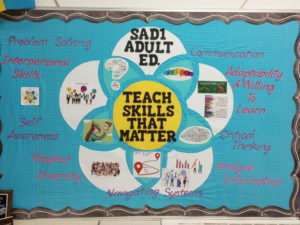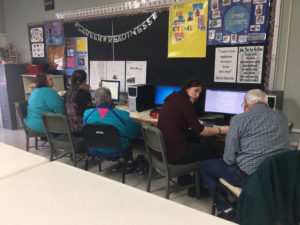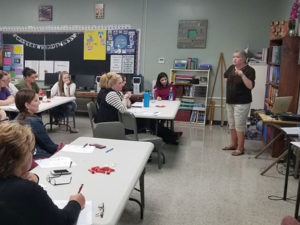 The Adult Education program in Presque Isle, Maine, sought an accessible, flexible resource they could use with both self-paced diploma students and a synchronous workforce training program. The program found that there was no perfect resource that fit the varied needs of their learners. To fill the gap, instructor Christa Galipeau developed an online course entitled Career Exploration and Workplace Skills, using elements of Teaching Skills That Matter (TSTM), Skills to Pay the Bills, and elearning Soft Skills Program. The course’s objective is to create a space where students can build self-awareness and career awareness while developing personal and workplace success skills.
The Adult Education program in Presque Isle, Maine, sought an accessible, flexible resource they could use with both self-paced diploma students and a synchronous workforce training program. The program found that there was no perfect resource that fit the varied needs of their learners. To fill the gap, instructor Christa Galipeau developed an online course entitled Career Exploration and Workplace Skills, using elements of Teaching Skills That Matter (TSTM), Skills to Pay the Bills, and elearning Soft Skills Program. The course’s objective is to create a space where students can build self-awareness and career awareness while developing personal and workplace success skills.
 Using the list of nine skills from TSTM, such as communication, critical thinking, and navigating systems, students review and define each skill and then complete activities, readings, and written reflections that deepen their understanding. For example, students review the definition of “interpersonal skills,” complete an inventory from Skills To Pay the Bills on the elements of teamwork, and then respond to the question about whether or not teamwork is worth the extra coordination and collaboration. Using the inventory, students are able to reflect on their own teamwork traits and skills, how they fit into a team, and any weaknesses they want to work on. In the section “Respecting Differences,” students watch a video on diversity and inclusion from the elearning Soft Skills Program and then write a reflection on their own biases and lessons learned from the video.
Using the list of nine skills from TSTM, such as communication, critical thinking, and navigating systems, students review and define each skill and then complete activities, readings, and written reflections that deepen their understanding. For example, students review the definition of “interpersonal skills,” complete an inventory from Skills To Pay the Bills on the elements of teamwork, and then respond to the question about whether or not teamwork is worth the extra coordination and collaboration. Using the inventory, students are able to reflect on their own teamwork traits and skills, how they fit into a team, and any weaknesses they want to work on. In the section “Respecting Differences,” students watch a video on diversity and inclusion from the elearning Soft Skills Program and then write a reflection on their own biases and lessons learned from the video.
One of the most powerful outcomes of the course was that learners came to realize how many of the needed success skills they already possessed. While the skills were previously amorphous and vague, students are now able to see how juggling their family schedule and planning meals is seen as an organizational skill. Others recognize that they have strong communication skills that are critical for career success.
At the conclusion of the course, students updated their resumes, and prepared an “elevator pitch,” using phrases like “I am a natural problem-solver, and on a team, I am a good leader and team gatherer.”
 Christa piloted the Career Exploration and Workplace Skills course with adult diploma students and plans to adapt it for the program’s workforce training programs, such as the Certified Nursing Assistant Integrated Education and Training (IET) program. She will work with the program’s IET partner employer to customize the skills for a healthcare work setting. Other instructors in the program are beginning to introduce the skills definitions and materials into their Adult Basic Education and math programming.
Christa piloted the Career Exploration and Workplace Skills course with adult diploma students and plans to adapt it for the program’s workforce training programs, such as the Certified Nursing Assistant Integrated Education and Training (IET) program. She will work with the program’s IET partner employer to customize the skills for a healthcare work setting. Other instructors in the program are beginning to introduce the skills definitions and materials into their Adult Basic Education and math programming.
Christa finds that connecting the course to students’ educational and career goals is key to persistence. Students persist in the course because they can choose which modules they want to complete based on their own goals and can work through the material as their schedules allow.
